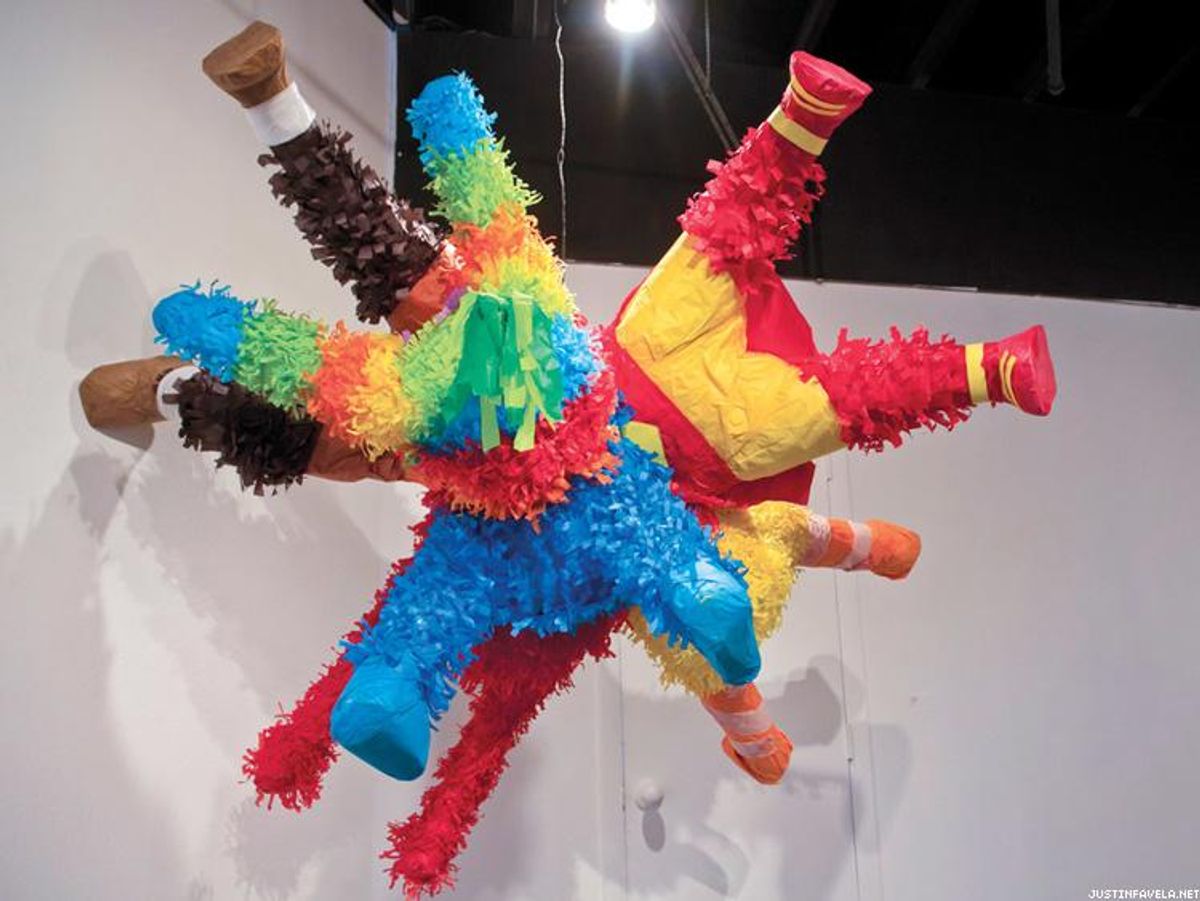LEXUS
This Queer Latinx Artist Is Transforming Piñatas Into Works of Art
This Queer Latinx Artist Is Transforming Piñatas Into Works of Art

It all started with a life-sized donkey piñata.
December 05 2017 12:31 PM EST
January 22 2018 9:59 PM EST
By continuing to use our site, you agree to our Private Policy and Terms of Use.
This Queer Latinx Artist Is Transforming Piñatas Into Works of Art

It all started with a life-sized donkey piñata.
Las Vegas-based artist Justin Favela was looking for a medium that represented him as a Mexican-Guatemalan when, as he puts it to Colorlines, "the first thing that I thought about was a pinata."
While initially hesitant to pursue an art form built around this mainstream symbol of Mexican culture, Favela has since embraced the technique, making everything from life-sized Chevy Impalas to the facades of motels. The sheer size of these pieces has grabbed the attention of many in the art community, impressed by the time-intensive skill required as well as the social messages within Favela's work.
For Favela, embracing the art form has meant embracing his identity as a Latinx artist. "I didn't want to be labeled as a Chicano or Latino or Brown artist," Favela told Colorlines. "Now I see it as a way to be visible."
In fact, many of his subjects are selected because of their ties with Chicano culture. In his profile for State of the Art, Favela spoke about his work "Lowrider Pinata," saying:
"I was thinking about pinatas as a symbol to represent Chicano culture," Favela said, "and then I started thinking about the lowrider and how that is such a huge part of Western Chicano culture. And then I thought it would be amazing to make a full-sized lowrider pinata."
The piece is impressive, a full-scale recreation of a 1964 Chevrolet Impala suspended from the ceiling in a way that suggests the car's iconic hydraulic modifications.
But it's not just Latinx identity that finds representation in Favela's work. His identity as a queer man is also an important element. When asked how his queer identity has affected his artistic pursuits, Favela admits his conservative background has played a role.
Look Mom, I'm on @remezcla!!! #gypsyrosepinata #gypsyroselowrider
A post shared by Justin Favela (@favyfav) on
"I grew up in a really conservative household--so I'm out, but at the same time I'm not," he said. "My family doesn't really talk about it, so I'm in this place where I'm being respectful of my family but at the same time I'm being me. That's very reflected in my art work in subconscious ways."
The very nature of his pinata art involves the act of covering up and hiding things under layers. And Favela agrees, stating, "All my work is covering things up. I'm hiding things, but by putting more colorful things on top of them." Considering his conservative upbringing, his art has become the perfect outlet. "All these suppressed feelings I can let out through my art work. It's fun how flamboyant I can be through my work."
Favela may call it flamboyance, but the art community seems to agree it's worthy of discussion and visibility. Starting at local installations and gallery exhibits, Favela's current installation has made the leap to art museum. Now through Oct. 22, Favela's Fridalandia is part of the Denver Art Museum's Mi Tierra exhibit.
Inspired by the work of Mexican artists Frida Kahlo and Jose Maria Velasco, Fridalandia reimagines Velasco's landscapes in a massive mural, made in Favela's papel china style. Additionally, Favela recreated Kahlo's Casa Azul, her patio garden, as depicted in the 2002 film Frida. As described by the museum's communications and public affairs coordinator, Shannon Robb, Favela's installation "questions perceptions about Mexico and the Americas, translating so-called high art through his use of craft materials to critique imagined symbols of Mexicanidad."
Despite a mostly white audience, Favela makes no secret that his work is for the people of his community. "I don't do it for the White audience. I do it for the Brown people. Even if there are few and far between, that's who I have in mind when I'm making the work." His queer identity is also a source of inspiration. Favela points to gay icons like Liberace, Beyonce and Alyssa Edwards as pop culture personalities that have had an impact on his work.
Despite the serious questions his art may raise, Favela is a fan of humor, always one to make a joke during an interview or laugh with his podcast co-host during their lunchtime chats. He's even thought about stand-up comedy as a career option. "I have been daydreaming of being a stand-up comedian lately. Making people laugh is very important."
Follow Favela on Twitter and Instagram to keep up-to-date on his latest projects. You can also tune-in to his podcast, Latinos Who Lunch, where he discusses politics, culture and humor with art historian Emmanuel Ortega.